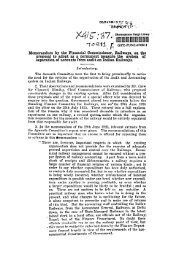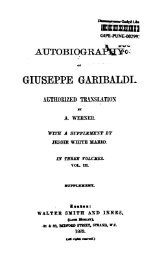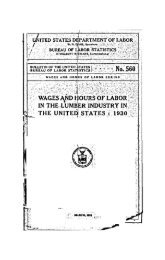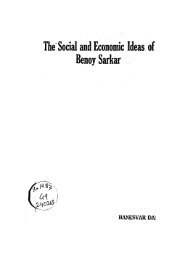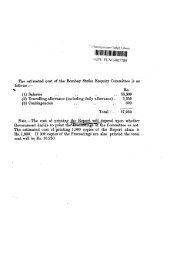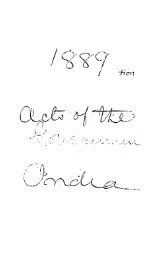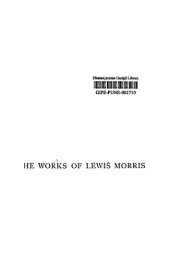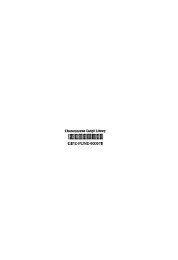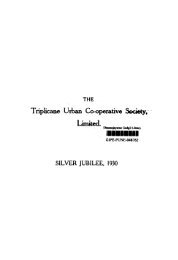- Page 1 and 2:
ananJayarao Gadgd Library I~~~ mlll
- Page 3 and 4:
M Jahuary 2nd, 192.5, 2 j' . INDIAN
- Page 5 and 6:
4 INDIAN OPINION Jannary ~nd. J925-
- Page 7 and 8:
has adopted a resolutIon ratifying
- Page 9 and 10:
8 INDIAN OPINION January 9t h, J 92
- Page 11 and 12:
approximate, the European deteriora
- Page 13 and 14:
INDIAN OPINION January 9th, 1925 FA
- Page 15 and 16:
14 iNDIAN OPINION January 16th. 19
- Page 17 and 18: ,6 INDIAN OPINION . January 16th, 1
- Page 19 and 20: a 9 P Ii o "P iii ii, " ....... A -
- Page 21 and 22: 20 INDIAN OPINION January 23rd, 192
- Page 23 and 24: 22 -- , INDIAN OPINION INDIA AND ~N
- Page 25 and 26: INDIAN OPINION January 23rd, 1925 ,
- Page 27 and 28: Guiana, and few less developed owin
- Page 29 and 30: . INDIAN OPINION we can go. The seg
- Page 31 and 32: INDIAN OPINION January 30th, 1925 -
- Page 33 and 34: INDIA~' Ul'lN 1UN February 6th, 192
- Page 35 and 36: ----'3:....:4~___'__________ I_N_D_
- Page 37 and 38: INDIAN OPINION February 6th, t'I' S
- Page 39 and 40: is a talk.of France paying America
- Page 41 and 42: ~''PUt' l~'.)1tl' lJ-ofe.l)'Ut '~1-
- Page 43 and 44: I N PI -\N OPIN ION February 13th,
- Page 45 and 46: INDIAN OPINION February 13th, 1925
- Page 47 and 48: '1!.:t1.f::!4:.:.6_-----------IN-D-
- Page 49 and 50: .... ~, ~,""I~ l"t16~te'l l"'~lcl'l
- Page 51 and 52: 50 INDIAN OPINION February 20th, 19
- Page 53 and 54: is that for the time being I am c-a
- Page 55: -2,4 __ _ fronted, along the great
- Page 58 and 59: February 27th, 1925 -INDIAN OPINION
- Page 60 and 61: _F_e~~!ry 27th, 1925~ ___ I:..::N_U
- Page 62 and 63: February 27th, 1925 INDIAN OPINION
- Page 64 and 65: ______________ 0 ______ 0_ 0 tDpilt
- Page 66 and 67: March 6th, 192$ tNOlAN OPINI\JN he
- Page 70 and 71: 'ttLlinn ®pinilltt ~r\No. II-VOl.
- Page 72 and 73: I M arch 13th, *92$ INDIAN OPiNION
- Page 74 and 75: , March 13th, 1925 INuf.~N OPINION
- Page 76 and 77: f;- IltOt! 'No. I2-VOl. XXIII. Frid
- Page 78 and 79: March 20th, 1925 INDIAN OPIN ION 71
- Page 80 and 81: M:Hch 20th. 'Me; ~NUIJ\N OPINlqN 79
- Page 82 and 83: ~pittillU No. 13-Vol. XXIII. Friday
- Page 84 and 85: iNDIAN OPINION ca'lO in the BUlle (
- Page 86 and 87: March 27th, 1925 INDIAN OPINION llt
- Page 88 and 89: J!ttfliatt ~pilliolt ','" No. 14-VO
- Page 90 and 91: April 3rd, 1925 INDIAN OPINION a9 -
- Page 92 and 93: April. 3rd, 1925 INDIAN UPINION 91
- Page 94 and 95: ·~ lillian ar11& + + ~'ttttgU No.
- Page 96 and 97: April 10th, 1925 INDIAN OPINION 95
- Page 98 and 99: 2pril loth, 1925 ______ 1 N_V_I A_N
- Page 100 and 101: No. 16-VoI. XXIII. Friday, April 17
- Page 102 and 103: ..... ~I' April J7th, 1925 INDIAN O
- Page 104 and 105: April 17th, 19%5 INDIAN UPINION 103
- Page 106 and 107: ~ ndiatt .C®pittiIlU No. 17-VoJ. X
- Page 108 and 109: , IJCtln un occ I"io 1 for jny to U
- Page 110 and 111: April 24th, 1925 INDIAN OPINION 109
- Page 113 and 114: t12 INDIAN OPINION May 1st, 1925 \
- Page 115 and 116: II4 INDIAN OPINION May 1st, 1925 Na
- Page 117 and 118: -llt~t!! ~(~ ~ 1ll1:RJ ThJ>lt 3;lt
- Page 119 and 120:
liS INDIAN OPINION May 8th, 1925 \
- Page 121 and 122:
120 INDIAN OPINION May 8th, 1925 ab
- Page 123 and 124:
tl.'ll\ "'h:'b ~~,~~ ~I"_"'\; t~lt
- Page 125 and 126:
INOIAN OPINION May 15th, 1925 menti
- Page 127 and 128:
126 INDIAN OPINION May 15th, 1915 \
- Page 129 and 130:
Jl'lPl", (~lt' ~thll!! 'Ut l-1r..'1
- Page 131 and 132:
INDIAN OPINION' May 22nd, 1925 Of c
- Page 133 and 134:
132 INDIAN OPINION May 22nd, 1925 Y
- Page 135 and 136:
134 __________________ I_N_D __ IA_
- Page 137 and 138:
INDIAN ()~INt()N man, and the ~\l't
- Page 139 and 140:
whole questiOn, and it it is at all
- Page 141 and 142:
INDIA IN IMPERIAL PARLIAMENT 'The E
- Page 143 and 144:
Reuter's tnessage understandil that
- Page 145 and 146:
144 INDIAN OPINION June 5th• 1925
- Page 147 and 148:
{NOlAN OPINION June 5th, 1925 probl
- Page 149 and 150:
148 INDIAN OPINION june 12th, 1925
- Page 151 and 152:
EUROPEAN ASSOCIATION AND MR. DAS Th
- Page 153 and 154:
15~_~,~,~, _______________ IM __ b_
- Page 155 and 156:
154 INDIAN OPIN ION June 19th, 1925
- Page 157 and 158:
INDIAN OPINION organisation and co-
- Page 159 and 160:
-"V~nd~mataram" and received Mahatm
- Page 161 and 162:
!NDIAN OPINION June 26th, 19z5 fate
- Page 163 and 164:
)62 , INDIAN OPINION June 26th, III
- Page 165 and 166:
, ,Anptl\er gFe\i~ figqr~ of tpe (t
- Page 167 and 168:
166 I NOlAN OPINION July 3rtl, ') 5
- Page 169 and 170:
168 INDIAN OPINION has been depende
- Page 171 and 172:
( \ ~.,,' _ INDIAN Ol'lNION .. J'"
- Page 173 and 174:
(NOlAN OPINION 1 uly' loth. 1925 .
- Page 175 and 176:
t74 INDIAN OPINION July loth. 1925
- Page 177 and 178:
lNDIAN OPINION July -loth,. 1925--
- Page 179 and 180:
__ I~7S~ ________________ t_N_D pre
- Page 181 and 182:
180 .ffblf1~ OPlNJON July 17th, 192
- Page 183 and 184:
~ pa4 J.o!llJ?~ratiVely' -\itjJ~.)~
- Page 185 and 186:
Freedom, and alas I to the very alt
- Page 187 and 188:
186 INDIAN OPINION July 24th, 1925
- Page 189 and 190:
~88 ·rNOIAN OPINION July 24th, 192
- Page 191 and 192:
~ I INblAN OPINION july 31st, 1925
- Page 193 and 194:
INDIAN OPINION July 31st, 1925 A...
- Page 195 and 196:
~.I~94~~ ________________ I_N_D_I_A
- Page 197 and 198:
INn, l\ N OPINION August 7th, i 5 s
- Page 199 and 200:
part of the toWD.\ here or to hold
- Page 201 and 202:
3 (To be read a Second Time on Mond
- Page 203 and 204:
5 / stncted number of such persons
- Page 205 and 206:
5 10 15 20 25 11. (1) Subject to th
- Page 207 and 208:
9 5 10. (g) within any class of per
- Page 209 and 210:
5 11 for registration from sm.h ASi
- Page 211 and 212:
200 l~-bIAN OPINION August 14th, 19
- Page 213 and 214:
202 INDIAN OPINION August 14th, 192
- Page 215 and 216:
204 INDIAN OPINION August 14th, 192
- Page 217 and 218:
a. ,.. ij ~ ,~ Itt ifil"f ~it.i itf
- Page 219 and 220:
enough, a,Dd it is as diffieult for
- Page 221 and 222:
.. # • ../' 210 INDIAN OPINION Au
- Page 223 and 224:
Augu!>t 21St, 1925 212 INDIAN OPINI
- Page 225 and 226:
INDIAN OPiNiON August 28th, 1925 AS
- Page 227 and 228:
INDiAN OPINION August 28th, 19~5 as
- Page 229 and 230:
218 INDIAN OPINION . August 28th, 1
- Page 231 and 232:
220 INDIAN OPINION September 4th, 1
- Page 233 and 234:
222 INDIAN OPINION September 4th, l
- Page 235 and 236:
k ['he ,fourth Qlllliv.ersary of th
- Page 237 and 238:
226 INDIAN OPINION September 4th, 1
- Page 239 and 240:
"S!'2'S Sefitember., 4th, 1925'.
- Page 241 and 242:
INDIAN OPINION September lIth. 1925
- Page 243 and 244:
Your committee hall further printed
- Page 245 and 246:
234 INDIAN opINION September lith.
- Page 247 and 248:
236 INnlAN OPINION September lith.
- Page 249 and 250:
~ln: lkl~!t.' ~~t:~ It. ... ~ ~ltl}
- Page 251 and 252:
INDIAN Uf~lNION September 18th, 192
- Page 253 and 254:
INOl \N OPINION September 18th. 192
- Page 255 and 256:
plate with il.ldiffetence the prosp
- Page 257 and 258:
INDIAN OPINION September 18th I Q !
- Page 259 and 260:
'jng which was most enthusiastic th
- Page 261 and 262:
was not a supporter of. the present
- Page 263 and 264:
September 25th, 1925 ~:--~---------
- Page 265 and 266:
, .... • 254 ____________ ~ _____
- Page 267 and 268:
the press of Durban and Mariuburg h
- Page 269 and 270:
I have this peculiar theory, that t
- Page 271 and 272:
~fts~ at aiU(i~t(;t dJi~.~ , ~ ~~rt
- Page 273 and 274:
INDIAN OPINION October 9th, 1925 ''
- Page 275 and 276:
Act 1922 in Section 7 (4); that the
- Page 277 and 278:
~~!lllf ~ljl!'\ tln= ~l~lc c~~~ I-D
- Page 279 and 280:
standing ord.ers and allowed Indian
- Page 281 and 282:
make it as dlfficulL and as inconve
- Page 283 and 284:
1}J,- 'HI} {:f H!}q 1~ lh1't~ UtJl1
- Page 285 and 286:
iNDIAN OPiNION October 23rd, 1925 t
- Page 287 and 288:
INDIAN OPINION October 23rd. 1925 T
- Page 289 and 290:
~78 __________________ IN __ O_IA_N
- Page 291 and 292:
INDiAN OPINION October 30th, 1925 t
- Page 293 and 294:
Kazi, Sorabj~e RUBtomjee, M. B. Nai
- Page 295 and 296:
* •• ~~ ••• **.***.*.~ ~
- Page 297 and 298:
286 INDIAN OPINION November 6th, 19
- Page 299 and 300:
.0 INDIAN OPINION November 6th 1925
- Page 301 and 302:
INDIAN OPINtON November 13th, 1925
- Page 303 and 304:
, They are "the same, yct not the s
- Page 305 and 306:
INDIAN OPINION November 13th, 192~
- Page 307 and 308:
~9_6 __ ~,~ ________________ IN __
- Page 309 and 310:
INDIAN OPINION November 2?th. 1925
- Page 311 and 312:
300 INDIAN OPINION November 20th, 1
- Page 313 and 314:
302 INDIAN OPINION 20. Having regar
- Page 315 and 316:
INDIAN OPINION November 20th, I925
- Page 317 and 318:
306 INDIAN OPINION November 27th, 1
- Page 319 and 320:
agitation in Chma, and added that t
- Page 321 and 322:
. 3. 10 INDIAN OPINION November 27t
- Page 323 and 324:
~3~t2 ____________________ 1_N_D_I_
- Page 325 and 326:
I 3 1 4 INDtAN opiNION December 4th
- Page 327 and 328:
316 INDIAN OPINION December 4th, 19
- Page 329 and 330:
, ' , Government of India Deputatio
- Page 331 and 332:
320 INDIAN OPINION December I. tho
- Page 333 and 334:
INDIAN OPINION ment again and refe~
- Page 335 and 336:
iNptAN OPINION t>ecernber 18th, 192
- Page 337 and 338:
Right of ent~y and residence in any
- Page 339 and 340:
INDIAN OPINION December 18th. 1"5 a
- Page 341 and 342:
330 INDIAN OPINION , becember 25~h.
- Page 343 and 344:
__ 3_j~2~ __________________ I_N_D
- Page 345:
INDJAN orIN ION December 25th. '9~S



